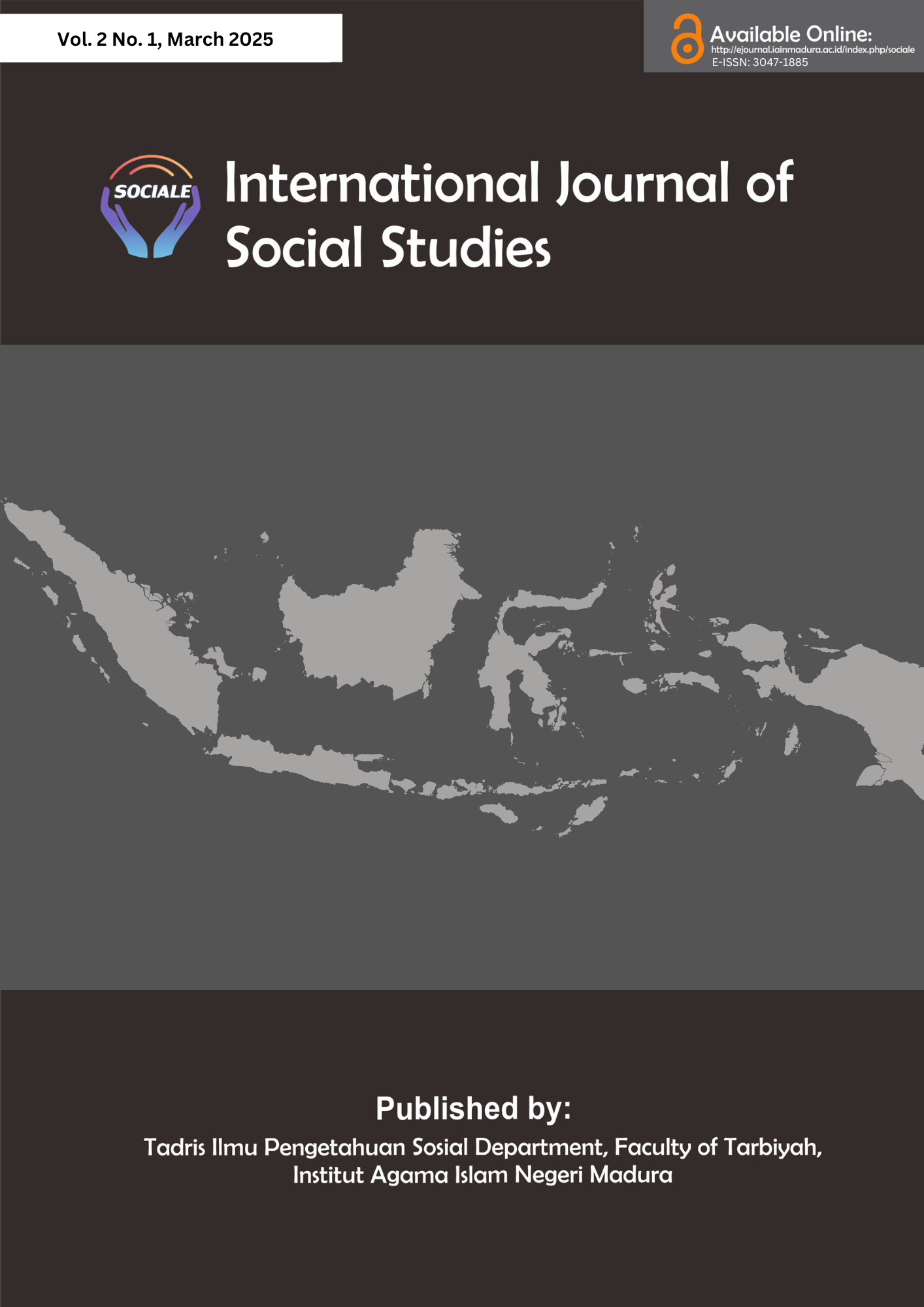Enhancing Geography Learning: Development of 'Map Box' (Kopeta) as an Innovative Educational Tool for 7th Grade Social Studies at SMPN 3 Pamekasan
 Abstract views: 41
,
Abstract views: 41
,
 PDF downloads: 18
PDF downloads: 18
Abstract
The design used in this research is R&D (research and design), based on facts found in the field, students' lack of motivation in learning, especially social studies subjects, because the use of media by teachers is limited to visual and audio-visual media only. Therefore, researchers decided to conduct research to develop learning media for social studies subjects, namely Map Box (KOPETA). The formulation of the problem in this research is how to develop Kopeta and how effective Kopeta is. The model that is used in this research is 4D model. The research results show that the Kopeta developed meets the eligibility requirements. The validation results from material experts were 4.0 and the validation results from media experts were 3.4 with good criteria described as valid criteria. Then the product was tested on class VII students at SMP Negeri 3 Pamekasan. The use of Kopeta can make learning activities more effective. Test results in small groups The average value before students used Kopeta was 49.00, whereas after using Kopeta it was 75.00 which was described as having good or effective criteria. After that, a large group trial of 33 students. Recapitulation results of field trials in large groups. The average value before students used Kopeta was 53.6. Meanwhile, after using Kopeta it was 80.6 which was described as having good or effective criteria.
Downloads
References
Andang, I. (2006). Education games. Pilar Media.
Arizka, N., & Khairuna, K. (2022). The effect of the team games tournament learning model assisted by question card media on student learning outcomes. BIO-INOVED: Journal of Biology-Education Innovation. https://doi.org/10.20527/bino.v4i3.13874
Creswell, J. W., & Creswell, J. D. (n.d.). Research design: Qualitative, quantitative, and mixed methods approaches. 291. Retrieved June 28, 2024, from https://books.google.com/books/about/Research_Design.html?id=Pr2VEAAAQBAJ
García-Lapresta, J., Moreno-Albadalejo, P., Pérez-Román, D., & Temprano-García, V. (2021). A multi-criteria procedure in new product development using different qualitative scales. Appl. Soft Comput.,106 , 107279. https://doi.org/10.1016/J.ASOC.2021.107279
Hambali, H., Harmonis, M., Rozi, F., & Milla, M. (2023). The Usage Of Magic Box-Based APE as an Effort To Improve Cognitive Aspects. WISDOM: Journal of Early Childhood Education. https://doi.org/10.21154/wisdom.v4i2.7462
Hidayatulloh, R., & Airlangga, P. (2023). Integration of Mapbox and Google Maps to Support Additional Features in Geographic Information Systems. SCIENCE AND TECHNOLOGY. https://doi.org/10.32764/saintekbu.v14i02.1411
Kristoforus Sukardi, Septian, Robertus Adi, Sarjono Owon, and M. L. (2022). The Use of Magic Box Media to Improve Achievement of Learning Students of Class Vii Smpk Virgo Fidelis Maumere on Procedure Text Material,. EduIndo: Journal of Indonesian Language and Literature Education, 3.1.
Rahayu, A. A., Mezzaluna, A. S., & Setiaji, B. (2022). Development of 3D Pageflip professional-based modules on light reflection and refraction to increase student learning independence. WaPFi (Wahana Pendidikan Fisika). https://doi.org/10.17509/wapfi.v7i1.45372
Ramli, M. (2012). Learning Technology Media. IAIN Antasari Press.
Richey, R., & Klein, J. (2014). Design and Development Research: Methods, Strategies, and Issues. https://doi.org/10.4324/9780203826034
Sapriyah, S. (2019). LEARNING MEDIA IN THE TEACHING AND LEARNING PROCESS. 2, 470-477. https://consensus.app/papers/media-pembelajaran-dalam-proses-belajar-mengajar-sapriyah/27e64b7ece6a528e8638a17be1ba5a6c/
Simamora, L. H., Hasibuan, H. B. and Lubis, Z. (2019). The Effect of the Application of Magic Box Games (Mystery Box) on the Language Development of 5-6 Year Old Children at Ra Al-Fajar Medan Denai. Raudhah Journal.
Sugiyono. (2017). Research Methods: Quantitative, Qualitative and R&D Approaches. Alfabeta.
Sugiyono. (2018). Quantitative, Qualitative and R&D Research Methods. Alfabeta.
Tan. et al, V. M. (2012). Magic box play activities in an effort to improve early childhood science skills. Journal of Early Childhood Education. Vol. 5 No. 1.










